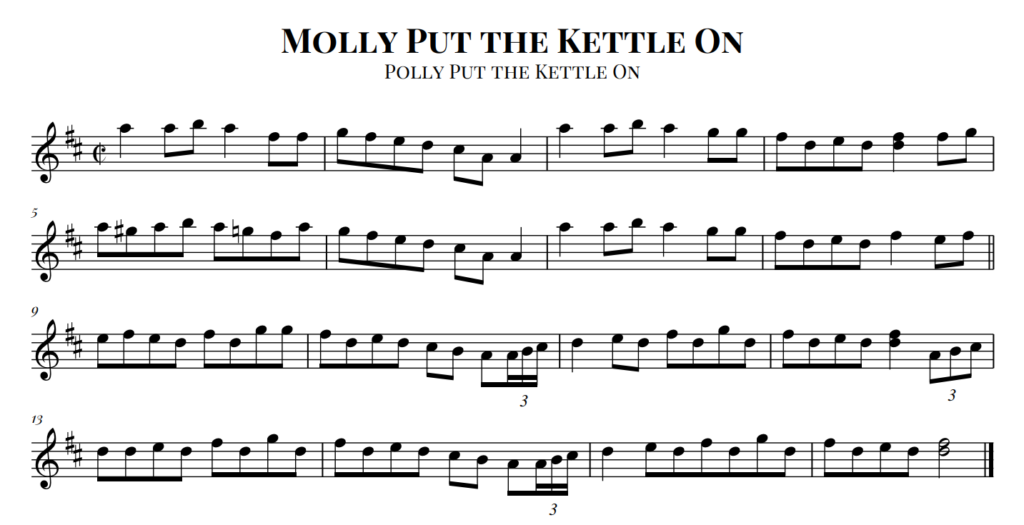Polly Put the Kettle On (Molly Put the Kettle On) is a Mother Goose children’s rhyme. The `modern’ Mother Goose dates back to the early 18th century when Charles Perrault’s fairy tale collection, Contes de ma Mère l’Oye was translated into English as Tales of My Mother Goose. Like the Germanic Brothers Grimm stories, Mother Goose tales were taken from oral tradition and traces of the stories can be found in early 17th century French literature. Mother Goose tales are also loosely linked to such historical figures as the wife of King Robert II of France, known as Berthe pied d’oie (Goose-Footed Bertha), Charlemagne’s mother Bertrade of Laon, regina pede aucae (the goose-foot queen), and even the biblical Queen of Sheba.1
The tune, Polly Put the Kettle On, appears in several early 19th century British musicians’ personal collections, including those of T.J. Dixon (Lincolnshire, 1798), Rev. R. Harrison (Cumbria, c. 1815), and J. Lishman (Lake District, c. 1825). In America, the tune is found in the personal collections of Gurdon Trumbull (Stonington, CT, 1801) and Ann Winnington (New York, 1810).2
The nursery rhyme is mentioned in Charles Dickens’ Barnaby Rudge (1841) which takes place during the Gordon Riots of 1780.3
The children’s nursery rhyme most likely heard today:4
Polly put the kettle on,
Polly put the kettle on,
Polly put the kettle on,
We’ll all have tea.
Sukey take it off again,
Sukey take it off again,
Sukey take it off again,
They’ve all gone away.5 6
—Kitty Steetle
fiddle tune instrumental:
fiddle tune with lyrics:
Last modified: November 30, 2022
By downloading this music, you agree to the Terms & Conditions.
- https://en.wikipedia.org/wiki/Mother_Goose[
]
- https://tunearch.org/wiki/Annotation:Polly_Put_the_Kettle_On_(1) [
]
- The Gordon Riots were riots in London, June 2–9, 1780, in response to the passing of the Papist Act of 1778. This act was intended to officially reduce discrimination against British Catholics in the British Miliary thereby assisting in replenishing its numbers during the American War of Independence.[
]
- As sung by my mother.[
]
- Opie, Iona and Opie, Peter, The Oxford Dictionary of Nursery Rhymes (Oxford University Press, 1951, 2nd ed., 1997), pp. 353–54.[
]
- In mid-eighteenth century British middle-class families, `Polly’ was a nickname for Mary and `Sukey’
was a nickname for Susan. (https://en.wikipedia.org/wiki/Polly_Put_the_Kettle_On) []
